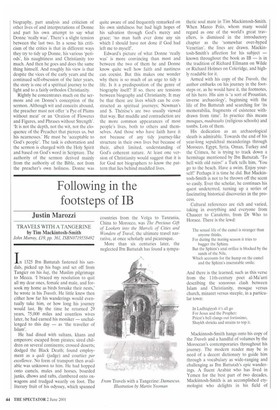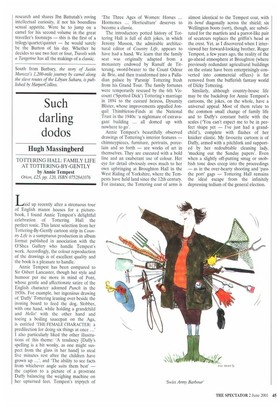Following in the
footsteps of TB
Justin Marozzi
TRAVELS WITH A TANGERINE by Tim Mackintosh-Smith John Murray, L-19, pp. 361, ISBN0719558492 In 1325 Ibn Battutah fastened his sandals, picked up his bags and set off from Tangier on his haj, the Muslim pilgrimage to Mecca. 'I braced my resolution to quit all my dear ones, female and male, and forsook my home as birds forsake their nests,' he wrote in his Travels. He little knew then either how far his wanderings would eventually take him, or how long his journey would last. By the time he returned 29 years, 75,000 miles and countless wives later, he had earned his moniker — unchallenged to this day — as 'the traveller of Islam'.
He had dined with sultans, khans and emperors: escaped from pirates; sired children on several continents; crossed deserts; dodged the Black Death; found employment as a qadi (judge) and courtier par excellence. No form of transport then available was unknown to him. He had hopped onto camels, mules and horses, boarded junks, dhows and rafts, clambered onto oxwagons and trudged wearily on foot. The literary fruit of his odyssey, which spanned countries from the Volga to Tanzania, China to Morocco, was The Precious Gift of Lookers into the Marvels of Cities and Wonders of Travel, the ultimate travel narrative, at once scholarly and picaresque.
More than six centuries later, the neglected Ibn Battutah has found a sympa thetic soul mate in Tim Mackintosh-Smith. When Marco Polo, whom many would regard as one of the world's great travellers, is dismissed in the introductory chapter as the 'somewhat over-hyped Venetian', the lines are drawn. Mackintosh-Smith's affection for his subject — known throughout the book as IB — is in the tradition of Richard Ellmann on Wilde or Richard Holmes on Coleridge, and highly readable for it.
Armed with his copy of the Travels, the author embarks on his journey in the footsteps or, as he would have it, the footnotes, of his hero. His aim is 'a sort of Proustian, inverse archaeology', beginning with the life of Ibn Battutah and searching for its memorabilia, fragments of existence withdrawn from time'. In practice this means mosques, madrasahs (religious schools) and tombs. Lots of them.
His dedication as an archaeological sleuth is admirable. Towards the end of his year-long sepulchral meanderings through Morocco, Egypt, Syria, Oman, Turkey and the Crimea, he is trying to track down a hermitage mentioned by Ibn Battutah. 'To hell with old ruins!' a Turk tells him, 'You go to the beach. Have a swim. Enjoy yourself!' Perhaps it is time he did. But Mackintosh-Smith is not to be thrown off the scent so easily. Ever the scholar, he continues his quest undeterred, turning up a series of fascinating historical discoveries in the process.
Cultural references are rich and varied, taking in everything and everyone from Chaucer to Canaletto, from Dr Who to Horace. There is the lewd:
The sexual life of the camel is stranger than anyone thinks, For during the mating season it tries to bugger the Sphinx.
But the Sphinx's anal orifice is blocked by the sands of the Nile, Which accounts for the hump on the camel and the Sphinx's inscrutable smile.
And there is the learned, such as this verse from the 11th-century poet al-Ma'arri describing the sonorous clash between Islam and Christianity, mosque versus church, minaret versus steeple, in a particular town:
In Ladhigiyyah it's all go For Jesus and the Prophet: Priest's bell clangs out fortissimo, Shaykh shrieks and strains to top it.
Mackintosh-Smith hangs onto his copy of the Travels and a handful of volumes by the Moroccan's contemporaries throughout his journey. The modern reader may be in need of a decent dictionary to guide him through a vocabulary as wide-ranging and challenging as Ibn Battutah's epic wanderings. A fluent Arabist who has lived in Yemen for the best part of two decades, Mackintosh-Smith is an accomplished etymologist who delights in his field of research and shares Ibn Battutah's roving intellectual curiosity, if not his boundless sexual appetite. Were he to jump on a camel for his second volume in the great traveller's footsteps — this is the first of a trilogy/quartet/quintet — he would surely be the Burton of his day. Whether he decides to use two feet or four, Travels with a Tangerine has all the makings of a classic.
South from Barbary, the story of Justin Marozzi's 1,200-mile journey by camel along the slave routes of the Libyan Sahara, is published by HarperCollins.











































































 Previous page
Previous page